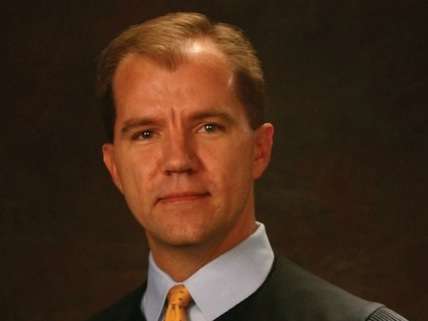From Bork to Willett: Is the Conservative Legal Movement Going Libertarian?
Libertarian legal ideas are gaining ground.

When President Ronald Reagan nominated Robert Bork to the U.S. Supreme Court in 1987, he praised his nominee for being "widely regarded as the most prominent and intellectually powerful advocate of judicial restraint."
It was no exaggeration. During his decades-long career as a law professor, federal judge, and legal commentator, Bork routinely preached the virtues of a deferential judiciary, arguing that in the vast majority of cases "the only course for a principled Court is to let the majority have its way."
Where Bork led, most legal conservatives were ready to follow. Judicial deference, or restraint, became a rallying cry on the legal right.
Borkean deference still holds sway today in many quarters. But it is also increasingly under fire from libertarian-minded legal thinkers who want the courts to play a more aggressive role in defense of individual liberty and against overreaching majorities.
Case in point: The new issue of Governing magazine profiles Don Willett, the Texas Supreme Court justice who recently appeared on Donald Trump's shortlist of potential U.S. Supreme Court candidates. Willett "is witty and approachable, and he's huge on Twitter," writes journalist Alan Greenblatt. "He's also one of the most influential jurists in the country right now."
Willett's rising influence signals Bork's declining favor. It shows that libertarian legal ideas are gaining ground.
To be sure, Bork and Willett are both "conservative" and both have ties to the Republican Party. But they differ in important ways. Bork wanted judicial minimalism; Willett wants judicial engagement. "The State would have us wield a rubber stamp rather than a gavel," Willett complained in the 2015 case of Patel v. Texas Department of Licensing and Regulation, "but a written constitution is mere meringue if courts rotely exalt majoritarianism over constitutionalism." (Willett also cites my book in his Patel opinion.)

As Greenblatt notes in his profile, "Willett is pretty blunt about his overall intent. He's a champion of individual rights, claiming a central role for the judiciary in protecting those rights against state encroachment." Bork, by contrast, was obsessed with limiting the judiciary's role. If Bork's great enemy was judicial activism, Willett's great enemy is judicial pacifism.
The differences don't stop there. According to Bork's interpretation, the 14th Amendment offers zero constitutional protection for economic liberty, which means that the courts have no business striking down government regulations on 14th Amendment grounds. Since the amendment does not explicitly refer to economic liberty, Bork reasoned, it does not protect it. When "the Constitution does not speak," he insisted, we are "all at the mercy of legislative majorities."
Willett takes a different view. "The Fourteenth Amendment's legislative record," he has pointed out, "is replete with indications that 'privileges or immunities' encompassed the right to earn a living free from unreasonable government intrusion."
Willett has even thrown shade in Bork's direction: "A conservative luminary, Bork is heir to a Progressive luminary, Justice Holmes, who also espoused judicial minimalism. Both men believed the foremost principle of American government was not individual liberty but majoritarianism." Willett clearly ranks individual liberty first.
Thirty years ago, when Borkian judicial deference was in its heyday, the conservative legal mainstream was largely hostile to libertarian legal ideas. That Don Willett is now championing those same ideas and is at the same time under possible consideration for a Supreme Court seat demonstrates just how far the dial has moved in a libertarian direction.
Editor's Note: As of February 29, 2024, commenting privileges on reason.com posts are limited to Reason Plus subscribers. Past commenters are grandfathered in for a temporary period. Subscribe here to preserve your ability to comment. Your Reason Plus subscription also gives you an ad-free version of reason.com, along with full access to the digital edition and archives of Reason magazine. We request that comments be civil and on-topic. We do not moderate or assume any responsibility for comments, which are owned by the readers who post them. Comments do not represent the views of reason.com or Reason Foundation. We reserve the right to delete any comment and ban commenters for any reason at any time. Comments may only be edited within 5 minutes of posting. Report abuses.
Please to post comments


Hope springs eternal!
If there is one thing this world needs, it is more hope. Less hipe, more hope.
What's that you say? Less hippies, more Bob Hope?
Clarence Thomas.
He's terrible. He votes for sex laws, police powers, censorship, against separation of church and state, etc.....
And he rubber stamps the "new professional" police.
Yes, the court remains the only reason to ever vote for a Republican president.
I know that people call you guys cosmos and all, but get off the Republican Party's nuts today. That's like three articles in a row that, while not explicitly pro-Republican, have been rather deferential to the party that 'conserves' big government.
Hillary for President !
He mentioned one judge out of about 30 that's on Trump's list that's sort of libertarian. That's not a good reason.
Are the rest less libertarian than avg.? If not, the balance is more libertarian. That's a good reason.
"the only course for a principled Court is to let the majority have its way."
This is the opposite of what the court is supposed to do.
"the only course for a principled Court is to let the majority have its way."
Objection, your honor. Bork didn't say that principle applied in "the vast majority of cases". What he actually said was that principle should apply in cases not "covered specifically or by obvious implication in the Constitution". Obviously we could spend hours debating when or how often that caveat applies and how much of a distinction that is.
I do agree that Justice Willett almost certainly takes a broader view of individual liberty and things like the right to privacy than Justice Bork did, and I agree with Justice Willett, who would make an outstanding USSCJ.
Libertarian moment, part 357? Nope, conservative judges love the police too much. A libertarian judge wouldn't say it's okay for the police to shoot your 3 dogs during an unnecessary armed assault on your home for owning a small amount of a plant that is arbitrarily deemed illegal in some states, just because you didn't pay the city to get a license for your dogs. A libertarian judge would deem dog licenses bureaucratic overreach, drug prohibition unconstitutional, armed raids an affront on a free people and shooting dogs animal cruelty, destruction of property and infliction of emotional distress.
"A libertarian judge..."
But these are Republican judges, and that's pretty close to being the same thing.
And professional football players are kind of the same thing as cops, since they both wear uniforms to work.
That's true, there are a lot of criminals in both fields ...
Shooting dogs 'animal cruelty' . . .
No libertarian judge would call shooting dogs 'animal cruelty' Pets are property. Shooting a dog isn't 'animal cruelty' but a destruction of personal property.
If you call it animal cruelty, you've been brainwashed by the progressive Left. And you probably believe in animal rights
But it is, in fact, cruel. Let's just call it an aggravating factor.
+1 correct interpretation of the BOR
Bork would probably be more at home within Progressive circles today, but then again that's not that surprising since the Republican party is becoming more Progressive each year. I'd love to see an end to Judicial deference when it comes to the Bill of Rights, personally, but if that means more actual 'judicial activism' as we currently know it than no thanks.
It's literally the Supreme Courts only real job, and they consistently fuck it up.
Actually this isn't really fair to Bork. Progressive justices want to actually legislate from the bench, I don't think that's what Bork was really trying to say.
Yeah, Bork didn't want to legislate from the bench, he just didn't want to put any limits on the legislature's ability to do what the majority said.
Tyrannosaurus Majoris, the most dangerous threat to civilization.
It's an easy position to take when "your team" control the legislature
Freedom Caucus?
Right now, the GOP is to the left of JFK. And far to the left of Barry Goldwater, who was also a decent human being. That's rare in a politician.
I'd vote for anyone who says that Jerry Falwell deserves a kick in the balls.
If you don't follow Don Willett on Twitter, you're doing yourself a disservice.
Right after the 2016 election, Justice Willett tweeted:
What would the Founding Fathers, who created the Electoral College, say about the America of 2016?
"Whoa . . . airplanes"
Probably
You know who loves Bork? Neil Gorsuch.
Gorsuch is much better than Sessions. Trump would get my vote if he shitcanned that atavism.
Courts should not decide cases. Rather, they should protect liberty first and foremost. Liberty mist take precedence over security. Liberty must take precedence over justice. Both are matters of old and sound jurisprudence in the U.S. Secondly, defend the primary principles which is summed up in the declaration, law and constitution Cases should be decided by juries.
They shouldn't decide cases?! Who should you take your case to, then, the Mafia?
I'm sure the Mob could assemble a jury.
very nice post. I like it. Thanks for sharing this information.
Tinder is the best online chatting application. Try it.
http://www.tinder-pc-download.com/ tinder for pc
http://www.tinder-pc-download.com/ tinder download